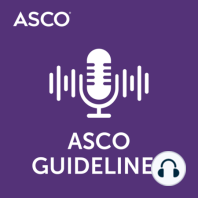15 min listen
Renal Toxicities: Management of irAEs Guideline (Part 8)
FromASCO Guidelines
ratings:
Length:
11 minutes
Released:
Nov 9, 2021
Format:
Podcast episode
Description
An interview with Dr. Umang Swami from the Huntsman Cancer Institute, author on “Management of Immune-Related Adverse Events in Patients Treated With Immune Checkpoint Inhibitor Therapy: ASCO Guideline Update.” He discusses the identification, evaluation, and management of renal toxicities in patients receiving ICPis, focusing on nephritis/acute kidney injury in Part 8 of this 13-part series. For more information visit www.asco.org/supportive-care-guidelines TRANSCRIPT [MUSIC PLAYING] SPEAKER: The purpose of this podcast is to educate and to inform. This is not a substitute for professional medical care, and is not intended for use in the diagnosis or treatment of individual conditions. Guests on this podcast express their own opinions, experience, and conclusions. The mention of any product, service, organization, activity, or therapy should not be construed as an ASCO endorsement. [MUSIC PLAYING] BRITTANY HARVEY: Hello, and welcome to the ASCO Guidelines podcast series brought to you by the ASCO Podcast Network, a collection of nine programs covering a range of educational and scientific content, and offering enriching insight into the world of cancer care. You can find all the shows, including this one, at asco.org/podcasts. My name is Brittany Harvey, and today, we're continuing our series on the management of immune-related adverse events. I am joined by Dr. Umang Swami from the Huntsman Cancer Institute at the University of Utah in Salt Lake City, Utah, author on Management of Immune-Related Adverse Events in Patients Treated with Immune Checkpoint Inhibitor Therapy: ASCO Guideline Update, and Management of Immune-Related Adverse Events in Patients Treated with Chimeric Antigen Receptor T Cell Therapy: ASCO Guideline. And today, we're focusing on renal toxicities in patients treated with immune checkpoint inhibitor therapy. Thank you for being here, Dr. Swami. UMANG SWAMI: Thank you, Brittany. And I appreciate the invitation to be here today. BRITTANY HARVEY: Great. Then first, I'd like to note that ASCO takes great care in the development of its guidelines and ensuring that the ASCO conflict of interest policy is followed for each guideline. The full conflict of interest information for this guideline panel is available online with the publication of the guidelines in the Journal of Clinical Oncology. Dr. Swami, do you have any relevant disclosures that are directly related to these guidelines? UMANG SWAMI: No, I do not have any relevant disclosures that are directly related to these guidelines. BRITTANY HARVEY: Thank you. Then let's dive into what we're here today to talk about. So what are these immune-related renal toxicities that are addressed in this guideline? UMANG SWAMI: So this guideline focuses on nephritis, or acute kidney injury, as an adverse event due to immunotherapy. Acute kidney injury, or AKI, is an uncommon complication of immune checkpoint inhibitor therapy. Just to give a little context before we start, the incidence of any grade AKI is around 1% to 2% in patients treated with a single agent immune checkpoint inhibitor, such as ipilimumab, nivolumab, or pembrolizumab, and 4.5% in those treated with anti-CTLA-4 for and anti-PD-1 combination of nivolumab plus ipilimumab therapy. The incidence of grade 3 or grade 4 AKI is very low. I will say less than 1% with single agents, and around 1.6% with the combination of nivolumab plus ipilimumab. While initial studies had quoted a small incidence of AKI with immune checkpoint inhibitor use, emerging data now suggests that a higher incidence might be present, which might range between 9.9% to around 29% of AKI with the immune checkpoint inhibitors. However, most of this extra toxicity is grade 1. The median time to onset of renal toxicity with these agents is around 14 weeks, but can range from 6.5 to 21 weeks. BRITTANY HARVEY: Thank you for that background information. I think it's helpful for clinicians to understand how rare or common these adverse eve
Released:
Nov 9, 2021
Format:
Podcast episode
Titles in the series (100)
Management of Immune-Related Adverse Events Guideline: An interview with Dr. Bryan Schneider of the University of Michigan on the ASCO clinical practice guideline to increase awareness, outline strategies, and offer guidance on the recommended management of immune-related adverse events in patients... by ASCO Guidelines
